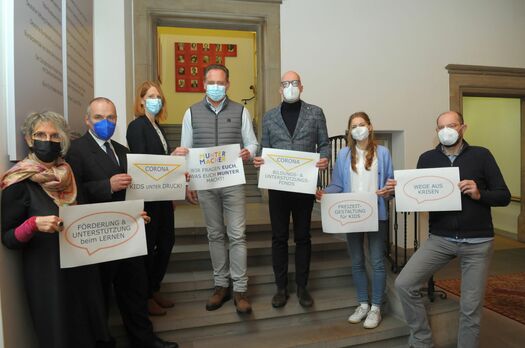Results of pick-me-up survey show how children and young people felt during lockdowns
University, city and Bohnenkamp Foundation present results

Osnabrück, 02.12.2021
How did Osnabrück children and young people experience the school closures during the past lockdowns? What wishes do they have with regard to school, family and leisure? The Muntermacher project addressed these and other aspects with an online survey in which a total of around 600 children and young people from 14 elementary school, 15 secondary schools and three vocational schools took part.
"In summary, the children can be divided into three groups. 27 percent (type 1) fared poorly to very poorly during the pandemic-related school closures, another 39 percent fared moderately (type 2), and 34 percent of the students fared well to very well," explains Prof. Dr. Sonja Nonte from the University of Osnabrück. "In line with the findings of Muntermacher, type 1 children and adolescents can be identified as a vulnerable group that was severely stressed both psychologically and physically by the school closures and had little compensatory recourse to family resources (contact persons at home as well as less support with (homework) supervision," explains Prof. Dr. Christian Reintjes, University of Osnabrück.
The aspects of loneliness (lack of social contacts, exchange with classmates, distance learning itself (self-discipline, independent learning) and coping with tasks (too difficult, too much) were particularly difficult. The Osnabrück comprehensive school students stated that loneliness and boredom and a high general burden were the main difficulties. Gymnasium students also found a lack of social contacts problematic and reported that they classified school closures as "lost time. High school students, secondary school students, junior high school students and vocational school students also missed social contacts and found distance learning with the factors of independent learning and lack of feedback difficult.
What do children and young people want for their leisure time in general? 44 percent wished to spend time with friends again, to be able to pursue hobbies (sports, etc.) and to be able to take part in activities such as going to the movies or swimming. Children and young people also wanted to go on excursions and vacations.
"With the survey, we want to give the children and young people a voice and scientifically evaluate their needs and wishes during the pandemic," explains Michael Prior, spokesman for the board of the Friedel & Gisela Bohnenkamp Foundation, on the background to the survey. Muntermacher is a project within the framework of the support fund of the city of Osnabrück in cooperation with the Friedel & Gisela Bohnenkamp Foundation. The "Corona Education and Support Fund", which goes back to a council resolution of April 20, 2021, provides 500,000 euros to support projects and measures that help mitigate the consequences of the pandemic for children and young people. "Since summer 2021, 50 offers and measures for thousands of children and young people in the city of Osnabrück have been implemented together with associations, initiatives, youth welfare service providers and many other institutions to mitigate both the cognitive and psychosocial consequences of the pandemic," explains Ute Tromp, head of the education department.
"The Muntermacher survey and the implementation of the Education and Support Fund show that at the local level, a community of responsibility that is ready to act can successfully, swiftly and unbureaucratically counter the effects of the Corona pandemic in the interests of children and young people. For this, I would like to express my sincere thanks to all those involved and supporters - especially the Bohnenkamp Foundation and the University," sums up First City Councilor Wolfgang Beckermann.
Text: City of Osnabrück, Department of Communication, Representation and International Affairs, Nina Hoss Photo (from left) Ute Tromp (City of Osnabrück), Michael Prior (Friedel & Gisela Bohnenkamp Foundation), Prof. Dr. Sonja Nonte and Prof. Dr. Christian Reintjes (University of Osnabrück), First City Councilor Wolfgang Beckermann, Sophie Bardelmeier and Thorsten Jansing (City of Osnabrück), Photo: City of Osnabrück, Nina Hoss